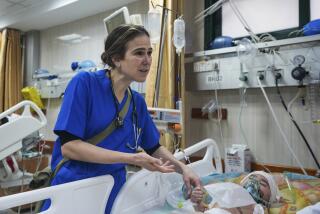Children’s Curiosity Proved All Too Deadly This Time
- Share via
BAGHDAD — For many Iraqi children, a car bombing or mortar strike isn’t a tragedy. It’s the biggest excitement of the week.
They are drawn by billowing smoke, police sirens and the certainty that journalists will soon arrive to interview witnesses. The children flood to the scene, pick through debris, wave to television cameras and interact with the U.S. troops who show up to clear the wreckage.
So it was Thursday when scores of children rushed to the site of a suicide car bombing in the working-class Amal district of Baghdad. They marveled at the crater left by the bomb, practiced their English on troops and rode bicycles around the American tanks. They accepted candy from a soldier.
Then a second suicide bomber barreled down the street toward the U.S. and Iraqi forces -- and the children who surrounded them. And then a third. The children were no longer observers of the attack, but its victims.
“I saw dead bodies scattered like sheep,” said Rashid Salih, 67, describing the scene where his grandson was killed.
Children’s shoes, clothing and crumpled red bicycles decorated with feathers littered the street.
Iraqi health officials said 35 of the 42 fatalities from Thursday’s blasts were children.
“What really hurt me was that most of the killed or injured people were children,” said Moyad Ismail, 25, who saw the U.S. soldier handing out candy minutes before the second explosion. “The children were making a ring around the soldiers.”
The disaster sent panic through the neighborhood. By Thursday afternoon, nearby Yarmouk Hospital was overrun with parents roaming the hallways and makeshift emergency rooms, looking for their children.
At the morgue, stunned mothers and fathers left with only body parts to take home and bury.
The day had begun with optimism. A U.S.-funded sewage facility, with its freshly painted blue pipes, was about to open. In most places, such an event would pass without notice. In Baghdad, where raw waste still flows through some neighborhoods, it was a time to celebrate.
The ceremony ended at 1 p.m. and families were making their way home when the first bomb rocked the area, officials said.
“The car exploded just as people were leaving the celebration,” said Ahmed Ghazi, a member of the Iraqi national guard.
U.S. military and Iraqi security forces quickly arrived and established a perimeter more than 100 yards from the site. Two U.S. tanks attempted to seal off the area.
But children frequently sneak past police lines in Iraq. Young boys know the back alleys and backyards and appear less threatening to police and troops.
Whereas their parents are horrified by Iraq’s growing violence, many children are curious and fascinated, often matter-of-factly pointing police and journalists to body parts, casually standing over bomb craters and debating the make and model of the suicide vehicle.
When Amal resident Khadija Talib, 35, heard the first blast, she hustled her four children through the dust and smoke and into the garden behind their house.
Her neighbors were not so cautious and their children rushed to the scene, she said.
“Many children from my neighbors were killed,” Talib said.
The second explosion came 10 to 15 minutes after the first, witnesses said. A black car sped toward the U.S. and Iraqi forces, chased by a national guard vehicle. Shortly before reaching the U.S. vehicles, it exploded.
“While we were evacuating the people hurt in the first explosion, the second one took place,” said Ahmed Dhaher, a rescue officer.
A few minutes later, a third car tried to drive over a street median, but police opened fire and stopped the vehicle short of its target, where it also exploded.
A man whose nephew was killed by shrapnel sat slumped on the curb, his head in his hands, weeping uncontrollably.
“They are killing scores of innocent Iraqis in order to kill one or two Americans. What sort of jihad is this?” asked Salih, the 67-year-old grandfather.
“What sort of religion allows such bad people to commit such hideous, horrible crimes?”
Suhail Ahmed of The Times’ Baghdad Bureau contributed to this report.
More to Read
Sign up for Essential California
The most important California stories and recommendations in your inbox every morning.
You may occasionally receive promotional content from the Los Angeles Times.













